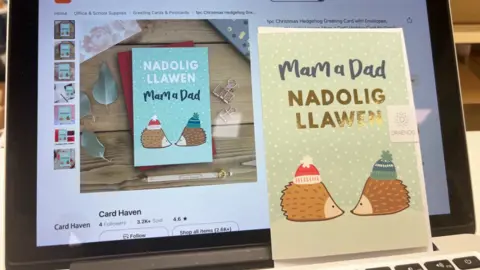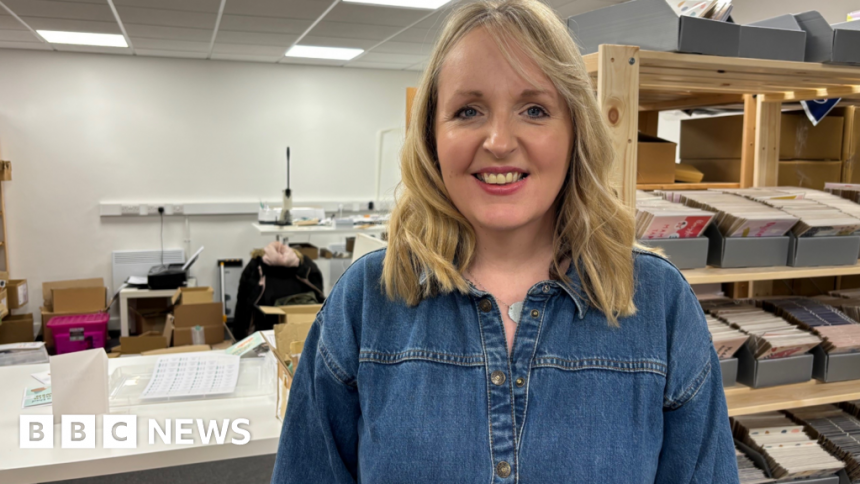Shopping giant removes copies of tiny firm’s cards
 BBC
BBCA small business owner said she was shocked and heartbroken to find her card designs being sold on giant online retailer Temu’s website without her knowledge.
Anwen Roberts, who owns design company Draenog, said identical versions of her Welsh language products appeared on the Chinese-based site after being copied without permission.
Ms Roberts said it was an added pressure for small businesses like hers in Caernarfon, Gwynedd, when she was trying to make a living.
Temu, which has now taken down the cards from its site, said it acted “quickly” when “potential infringements” were reported, and its goal was to protect brands and artist rights.
Temu, which is owned by the Chinese giant PDD Holdings and it was valued earlier this year at $150bn (£117bn), is a marketplace where third-party sellers offer their products directly to customers.
Ms Roberts said it was a “massive shock” to see her work and designs being sold online without her knowledge.
“They were identical and they used the designs we have online,” she told Newyddion S4C.
“It just breaks your heart a bit to know someone has used your work, put it out there and is potentially making money from something that I as a small business have created.”

Among the cards sold through Temu was nadolig llawen mam a dad – merry Christmas mum and dad in Welsh – featuring two hedgehogs nose to nose while snow falls.
Both the colouring, greeting and designs were the same.
The Temu site card read nadolig llawen mam a dad while Draenog’s is mam a dad nadolig llawen.
Another Temu site card showed a large balloon with penblwydd hapus – happy birthday – written on it and tied to a dachshund, which was identical to a Draenog card.
Temu, which sells everything from clothes to electronics and furniture, launched in the US in 2022 and later in the UK and the rest of the world, and ships to about 50 countries.

“They can just take hundreds of thousands of images, take them off the internet, create some text, do it really quickly and they miss out the bit of weeks and months and hours of working with small businesses like I do and putting a lot of time and energy in,” said Ms Roberts.
She said the onus on people like her to report issues was frustrating and time-consuming as there was “also the time of having to track them down and knowing your rights”.

What can companies do to protect their rights?
UK government body the Intellectual Property Office called IP infringement both a “local and global challenge” and said it worked with others to “help tackle the threat it poses to businesses and consumers”.
The IPO said it engaged with major e-commerce stores to remove goods which infringed rights or were counterfit. It also spoke to them to “permanently remove persistent sellers from their platforms” and “published guidance to help traders protect their IP rights on all major e-commerce stores, including Temu”.
The IPO said: “If people believe that their IP rights are being infringed, or suspect such goods are being offered for sale on e-commerce sites or social media marketplaces, they should make use of the tools these sites provide and always report this.”
Fflur Elin of the Federation of Small Businesses (FSB), said its research indicated one in five small firms experienced copying of their work when using the biggest platforms.
“This is extremely challenging and many often feel powerless when taking disputes to larger companies,” she added.
The FSB wants the UK government to “implement a system that allows dispute resolution between the larger companies and the small businesses and that is paid by a mechanism that raises the fees from the big platforms”.
Temu said it investigated this case and “removed the infringing products that were found”
In a statement it added: “For sellers who repeatedly violate these rules or commit serious infringements, we permanently ban them from the platform and remove all of their products.
“We have invested heavily in IP [intellectual property] rights protection, expanded our IP team, and introduced an IP portal and brand protection centre to increase the effectiveness and efficiency of handling infringement claims.
“As a result, we resolve over 99% of takedown requests within just a few days, which is faster than the industry average.”





